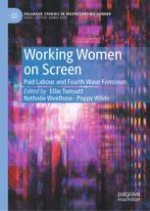2024 | OriginalPaper | Chapter
6. Recuperating Women’s Care Work in 2010s Television Fictions of Nurses and Nursing in the Neoliberal NHS
Author : Hannah Hamad
Published in: Working Women on Screen
Publisher: Springer International Publishing
Activate our intelligent search to find suitable subject content or patents.
Select sections of text to find matching patents with Artificial Intelligence. powered by
Select sections of text to find additional relevant content using AI-assisted search. powered by
